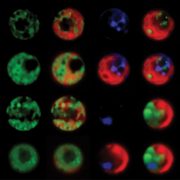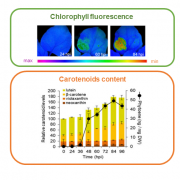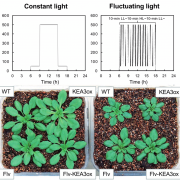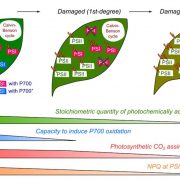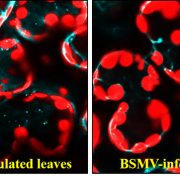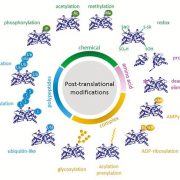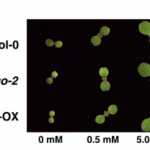Nuclear-encoded synthesis of the D1 subunit of photosystem II increases photosynthetic efficiency and crop yield (Nature Plants)
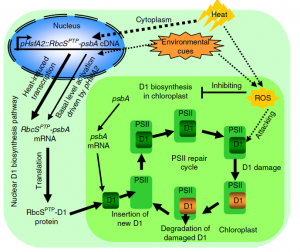 Photosystem II (PSII) is a protein complex located in the thylakoid membrane of chloroplasts that is involved in executing the initial reaction of photosynthesis in plants. When plants are exposed to extreme temperature conditions, PSII gets damaged. To repair the damage, one of the core proteins of PSII, the D1 protein, needs to be synthesized and replaced. We know that the D1 protein is synthesized from psbA messenger RNA in the chloroplast, but what will happen if the D1 protein synthesis pathway is supplemented through a gene of nuclear origin? To answer this question, Chen et al. used a bioengineering strategy to create mutant lines expressing psbA cDNA in the nucleus using the heat shock transcription factor (AtHSFA2) promoter. When these transgenic lines were grown in the presence of heat stress, they showed enhanced photosynthetic capacity and thermotolerance. Not only this, but these lines also showed increased biomass and overall yield compared to the wildtype in both control and heat stress conditions. This paper demonstrated that supplementation of D1 protein from the nucleus not only increases the repair mechanism of PSII but also leads to vigorous growth and increased net photosynthetic assimilation rates, a strategy that would be useful in addressing the impacts of global warming on plant growth and yield. (Summary by Sunita Pathak @psunita980) Nature Plants 10.1038/s41477-020-0629-z
Photosystem II (PSII) is a protein complex located in the thylakoid membrane of chloroplasts that is involved in executing the initial reaction of photosynthesis in plants. When plants are exposed to extreme temperature conditions, PSII gets damaged. To repair the damage, one of the core proteins of PSII, the D1 protein, needs to be synthesized and replaced. We know that the D1 protein is synthesized from psbA messenger RNA in the chloroplast, but what will happen if the D1 protein synthesis pathway is supplemented through a gene of nuclear origin? To answer this question, Chen et al. used a bioengineering strategy to create mutant lines expressing psbA cDNA in the nucleus using the heat shock transcription factor (AtHSFA2) promoter. When these transgenic lines were grown in the presence of heat stress, they showed enhanced photosynthetic capacity and thermotolerance. Not only this, but these lines also showed increased biomass and overall yield compared to the wildtype in both control and heat stress conditions. This paper demonstrated that supplementation of D1 protein from the nucleus not only increases the repair mechanism of PSII but also leads to vigorous growth and increased net photosynthetic assimilation rates, a strategy that would be useful in addressing the impacts of global warming on plant growth and yield. (Summary by Sunita Pathak @psunita980) Nature Plants 10.1038/s41477-020-0629-z
[altmetric doi=”10.1038/s41477-020-0629-z” details=”right” float=”right”]


